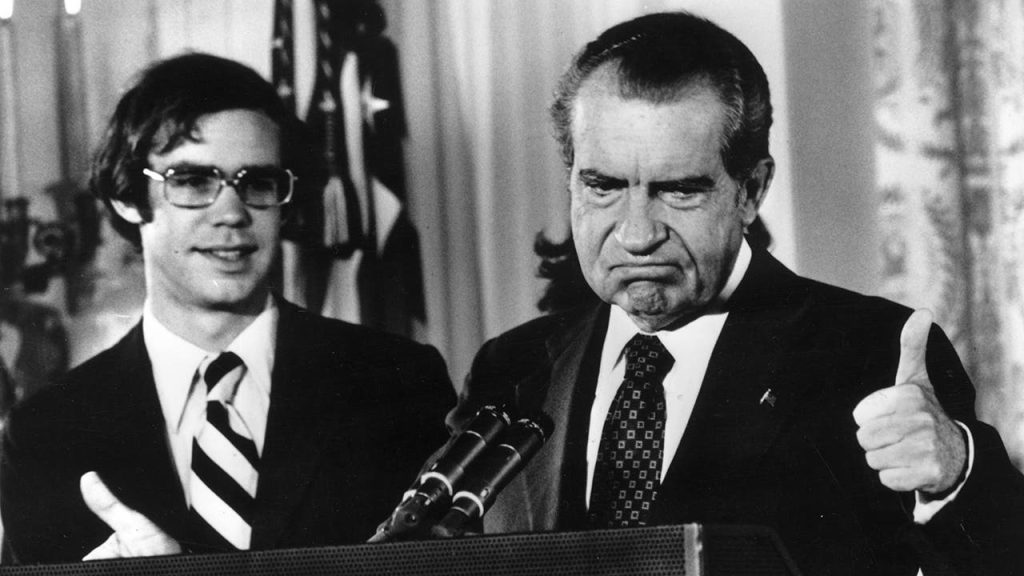Summarize this content to 2000 words in 6 paragraphs President Richard Nixon, the 37th U.S. president, announced he would be resigning from the office on this day in history, Aug. 8, 1974.In a speech delivered to the nation from the Oval Office, Nixon said his resignation would go into effect “at noon tomorrow.”On August 9, Gerald Ford would assume the presidency as the nation’s 38th president. Nixon was the first U.S. president to resign from the position. He left the highest office in the land in the face of likely impeachment amid the Watergate scandal, which involved his administration’s cover-up of spying activities on the Democratic Party’s headquarters during the election. ON THIS DAY IN HISTORY, AUGUST 7, 1947, THOR HEYERDAHL AND THE KON-TIKI RAFT MAKE IT TO POLYNESIA”In all the decisions I have made in my public life, I have always tried to do what was best for the nation,” said Nixon in his speech. “Throughout the long and difficult period of Watergate, I have felt it was my duty to persevere, to make every possible effort to complete the term of office to which you elected me,” he added. Nixon said that he did not believe he had the support of Congress to continue the remainder of his presidential term. He had been re-elected president in 1972 in a landslide victory over Democrat George McGovern, taking 60.7% of the popular vote and carrying 49 states (Nixon also became the first Republican ever to sweep the South, while McGovern took just 37.5% of the popular vote). “I have never been a quitter. To leave office before my term is completed is abhorrent to every instinct in my body,” said Nixon. “America needs a full-time president and a full-time Congress, particularly at this time with problems we face at home and abroad.” “But as president,” he continued, “I must put the interest of America first. America needs a full-time president and a full-time Congress, particularly at this time with problems we face at home and abroad.”The president said that if he were to stay in office, fighting his way through Watergate to try to vindicate himself “would almost totally absorb the time and attention of both the president and the Congress in a period when our entire focus should be on the great issues of peace abroad and prosperity without inflation at home.”ON THIS DAY IN HISTORY, SEPT. 26, 1960, KENNEDY AND NIXON BATTLE IN FIRST TELEVISED PRESIDENTIAL DEBATE”Therefore, I shall resign the presidency effective at noon tomorrow. Vice President Ford will be sworn in as president at that hour in this office,” he said. Nixon said that by resigning from the presidency, he hoped that he would have “hastened the start of that process of healing, which is so desperately needed in America.” “I regret deeply any injuries that may have been done in the course of the events that led to this decision,” he said. “I would say only that if some of my judgments were wrong, and some were wrong, they were made in what I believed at the time to be the best interest of the nation.”Nixon then thanked his family, friends and the “many others who joined in supporting my cause because they believed it was right” — saying he would be “eternally grateful” for their support. ON THIS DAY IN HISTORY, SEPT. 19, 1796, PRESIDENT GEORGE WASHINGTON ISSUES FAREWELL ADDRESS”And to those who have not felt able to give me your support, let me say I leave with no bitterness toward those who have opposed me, because all of us, in the final analysis, have been concerned with the good of the country, however our judgments might differ,” said Nixon.He then urged people to “join together in affirming that common commitment and in helping our new president succeed for the benefit of all Americans.” Ford would serve out the remainder of Nixon’s term before losing the 1976 election to President Jimmy Carter. One month to the day of Nixon’s resignation announcement, Ford announced that he had decided to “grant a full, free and absolute pardon unto Richard Nixon for all offenses against the United States which he, Richard Nixon, has committed or may have committed.” As a result, Nixon would not face any charges for his role in the Watergate scandal.Nixon spent the years following his presidency taking foreign trips on behalf of the United States and offering counsel based on decades of experience. While the former president departed the White House amid scandal in 1974, his legacy includes being the architect of détente with the Soviet Union during the Cold War. For more Lifestyle articles, visit www.foxnews.com/lifestyleIn 1972, Nixon became the first U.S. president to visit Moscow, where he signed the Anti-Ballistic Missile Treaty and the Strategic Arms Limitation Treaty with Soviet General Secretary Leonid Brezhnev. In addition, Nixon spent the years following his presidency taking foreign trips on behalf of the United States and offering counsel based on decades of experience to guide U.S. policy in the post-Cold War era. Nixon also foresaw that relations between Russia and Ukraine would dissolve. He called the situation in Ukraine “highly explosive.” “If it is allowed to get out of control,” Nixon told then-President Bill Clinton in a letter written on March 21, 1994, “it will make Bosnia look like a PTA garden party.” Nixon died on April 22, 1994, at age 81, notes the Nixon Presidential Library and Museum in Yorba Linda, California.Chris Pandolfo of Fox News Digital contributed reporting.
Keep Reading
Subscribe to Updates
Get the latest creative news from FooBar about art, design and business.
© 2025 Globe Timeline. All Rights Reserved.


